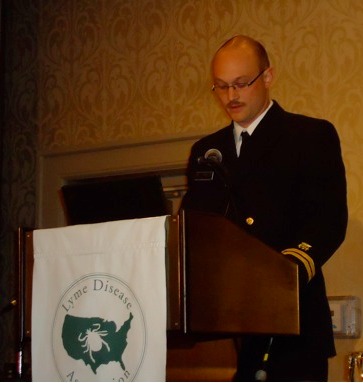
SHARE THIS ARTICLE:
LDA Provides Steps from CDC to Have Lyme Carditis Deaths Investigated
The CDC published the article (on Lyme carditis) to raise awareness among medical examiners, coroners, and pathologists of Lyme carditis as a cause of sudden cardiac death. The following is an excerpt from CDC on what people should do if a loved one dies of suspected Lyme carditis, and they want to seek further confirmation from the Centers for Disease Control & Prevention (CDC). Video and information on the Lyme carditis deaths at https://www.medscape.com/viewarticle/818773
Click here for Update on Lyme Carditis Deaths 10-31-2014
 Joseph D. Forrester, MD lead author of the Lyme Carditis study, speaking at the 2014 LDA/Columbia University Lyme & Tick-Borne diseases Conference in may in Rhode IslandFROM CDC: How to Identify Additional Cases
Joseph D. Forrester, MD lead author of the Lyme Carditis study, speaking at the 2014 LDA/Columbia University Lyme & Tick-Borne diseases Conference in may in Rhode IslandFROM CDC: How to Identify Additional Cases
We hope that this report will allow us to identify any additional cases, which in turn will help us better understand and prevent this tragic outcome. Since releasing the MMWR article, we have received several inquiries asking about the process for investigating deaths potentially due to Lyme carditis…. I wanted to provide you with information about what we are looking for when we investigate cases and how the process usually works.
Criteria
There are two criteria that need to be met before CDC can investigate a suspected case of Lyme carditis:
1) Is blood, serum, or tissue available? If there is no heart tissue or serum from the deceased, then there no way we can confirm Lyme carditis as the cause of death.
2) Did the person live in or recently travel to a high-incidence Lyme disease region?
There are approximately 400,000 people who die each year in the United States from sudden cardiac death. Most of these individuals have coronary artery disease or structural heart problems. Testing all of these hearts is not possible. We must focus on people who lived in geographic areas where cases are most likely to occur.
How Does the Investigation Proceed
Now I want to provide a little bit of information about how we actually investigate cases.
The first step involves the physician, medical examiner, pathologist, coroner or family member notifying the state or local public health department. If people contact you regarding deceased loved ones, please direct them to the state or local public health department. I want to emphasize that there are many factors that go into whether and to what degree cases will be investigated, and callers should understand that contacting their state or local health department does not necessarily mean that their case will be investigated extensively. One thing family members can do is have information available regarding the treating physician or the name of the hospital where their loved one died or received care. If they have copies of the autopsy report this is very helpful, but not necessary. All of this information can help facilitate a health department-initiated investigation.
The second step, if indicated, is for the state or local health department to contact CDC. CDC will then work together with state/local public health officials to investigate the cases and attempt to be as timely with the investigation as possible, while ensuring that the information released is both factual and confirmed. This is a reason it is essential for us to have serum and tissue to test in addition to our epidemiologic investigation.
Summary
In summary, in order for CDC to investigate a case of suspected Lyme carditis, there needs to be serum or tissue available. If there is, we recommend that you direct callers to their state or local health department. Feel free to provide them the MMWR MMWR: Three Sudden Cardiac Deaths Associated with Lyme Carditis — United States, Nov. 2012 — July 2013 [PDF – 28 pages]. so that they can reference it when calling their state or local health department. The states can then contact CDC if an investigation is indicated and they would like CDC assistance.
Joseph D. Forrester, MD lead author of the Lyme Carditis study, speaking at the 2014 LDA/Columbia University Lyme & Tick-Borne diseases Conference in may 201 in Rhode Island





